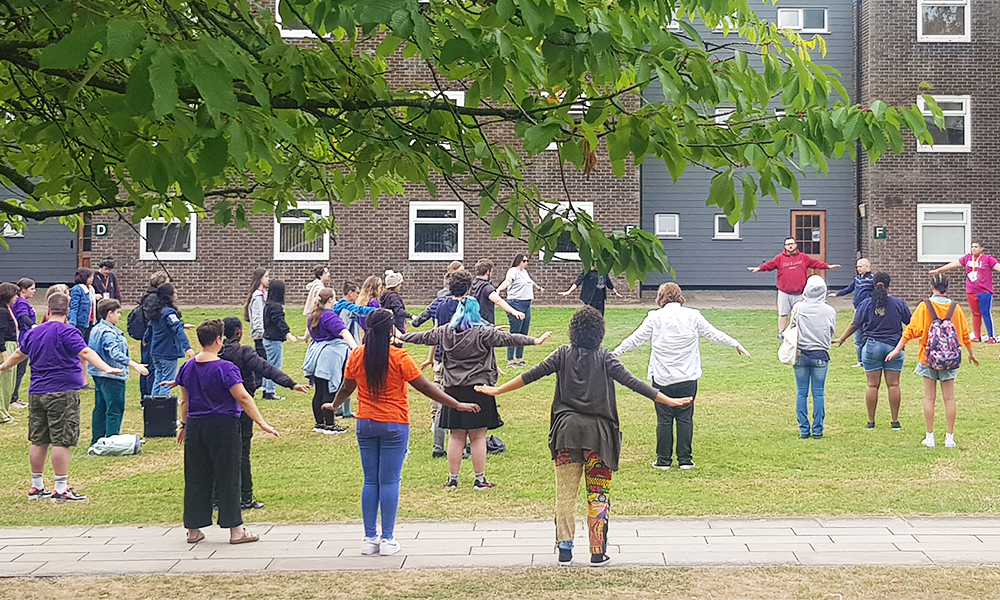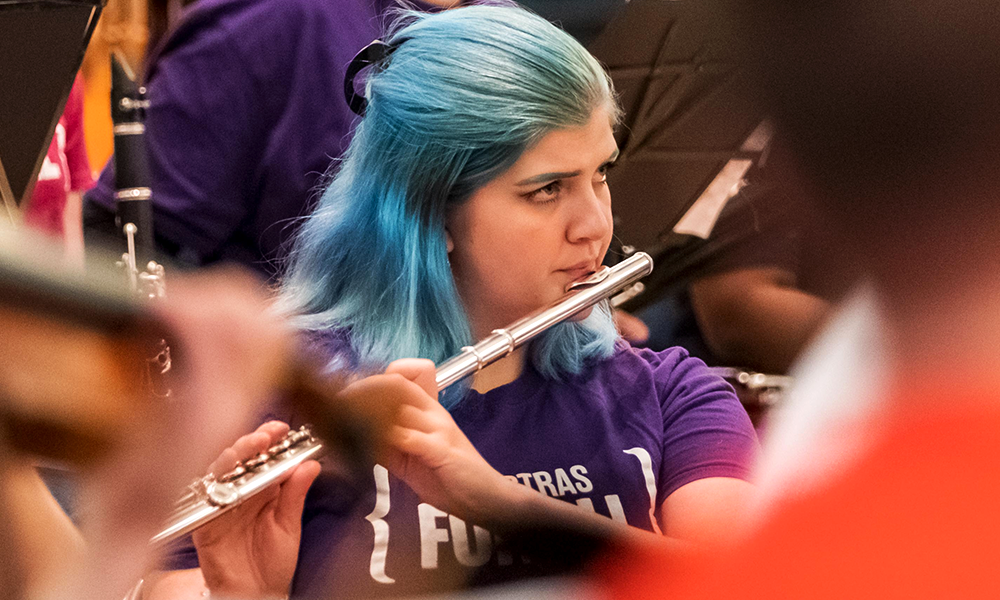From fundraising experts and young musicians to marketing-savvy professionals, here we introduce the latest additions to our team…
Orchestras for All (OFA) is delighted to announce that its Board of Trustees has welcomed six inspiring new members in a bid to elevate its practice and take the charity to new heights.
The decision comes as OFA continues to strive towards its bold vision: a country where all young people have access to the benefits of orchestral music-making regardless of the daily challenges they might be facing.
According to the Young Trustees Movement, less than 3 per cent of charity trustees are aged 30 and under despite young people often being an integral part of their work, while one in 12 trustees are named either John or David – highlighting the growing need for board diversity across the sector.
With this in mind, OFA is proud to share that its new trustees include Belfast-based musician, Chloe Morgan – an alumna of its inclusive, non-auditioned youth orchestra, National Orchestra for All (NOFA), who participated in three seasons of the programme and also supported the charity as a dedicated Young Leader, Youth Board member and co-host of OFA’s online fundraising launch event last winter.
This means that a quarter of OFA’s Board of 12 Trustees are currently aged 23 and under or alumni of its programmes. Chloe said: “Joining OFA back in 2018, I had no idea that I would wind up a trustee but I always wanted to give back to the organisation that led me down the path to here. From a young age, I’ve had a passion for politics and community work (and of course music) but it was joining OFA that made me realise the gap that existed for accessible music-making – and the need to fill that gap.”
Chloe continued: “Having benefitted so much from music and NOFA, I’m excited to help OFA evolve and I’ve already been involved in discussions about exciting new things. Learning from the OFA team and Board of Trustees is a big thing for me – they have so much experience in so many fields and I’m sure I’ll be all the wiser from working with them. Most importantly, I’m ready for OFA to achieve what the Youth Board likes to call “world domination!”.
Learn more about Orchestras for All’s young musicians >
Joining Chloe on the Board is senior leader in the international development sector, Rosie Parkyn, who runs a radio station for young people at Riverside Studios, and Rachael Adediran, who takes over from former trustee, Emily Sayers, and has kickstarted a culture of music-making for hundreds of young people during her time as Associate Assistant Principal at Skinners’ Academy in Hackney, London.
Rosie said: “I believe everyone should have the opportunity to access and make music as much as they wish. It is always life-enhancing and can be transformational. I am frustrated that these opportunities are still not available to all young people – they should not be a luxury. This is why I support the fantastic work of Orchestras for All. I am immensely proud to be a Trustee and hope that my professional experience in non-profit leadership will help this organisation realise its immense potential.”
Rachael added: “I first knew music was going to feature in my life aged seven when I passed the ‘test’ to have flute lessons at school and, in the same year, joined the Steel Band – no test necessary! These two steps started me on a lifelong journey of music-making and I have actively worked to remove barriers to participation for young people. OFA also does fantastic, truly inclusive work in removing those barriers, so I'm really excited to be part of its journey as a Trustee and support the team who drive it forward!”
Pictured (clockwise): New Orchestras for All trustees Rachael Adediran, Chloe Morgan, Philip Raperport, Rosie Parkyn, Dominic Parker and Lucinda Coulthard
Working alongside Rosie and Rachael is Director of BBC Scottish Symphony Orchestra, Dominic Parker, whose background includes fundraising and marketing for Southbank Centre, London Philharmonic Orchestra and Royal Welsh College of Music and Drama, as well as freelance arts fundraiser and former Head of Development at Scottish Chamber Orchestra, Lucinda Coulthard, and Commissioning Executive for BBC Sounds and Radio 3, Philip Raperport.
Dominic said: “OFA is doing incredible work and is at a pivotal point in its development, having just joined the Arts Council’s NPO portfolio. I’m very happy to be joining the Board of Trustees and to lend my support and experience as this inspirational company continues to make music with hundreds of young people each year.”
Lucinda commented: “I can’t remember when music wasn’t part of my life. Learning the recorder with my classmates during Year one at Primary School was possibly the first time I felt genuinely good at something – and now I know how much I benefitted from that newfound confidence. I firmly believe that every young person should be able to achieve their potential – and there is plenty of evidence to prove how much performing music in ensembles can help with so many important life skills. I’m so pleased to be a Trustee of OFA and I look forward to playing my part in its future.”
Watch National Orchestra for All’s epic summer concert >
Philip added: “The role of collective music-making in stimulating creativity, developing social skills and supporting wellbeing is hugely undervalued, and OFA’s mission to support and empower young people through access to instruments and playing music together has never been more important. As a Board Trustee, I hope I can play a small part in supporting the charity’s big ambitions. I’m most excited about working with and learning from the Youth Board and other young trustees. OFA is unique in the way it prioritises and champions young voices, not only through its programmes but within the charity itself.”
On behalf of everyone at Orchestras for All, huge congratulations to each of our new trustees and a warm welcome to the team!
Please support OFA’s life-changing programmes and donate today >






























